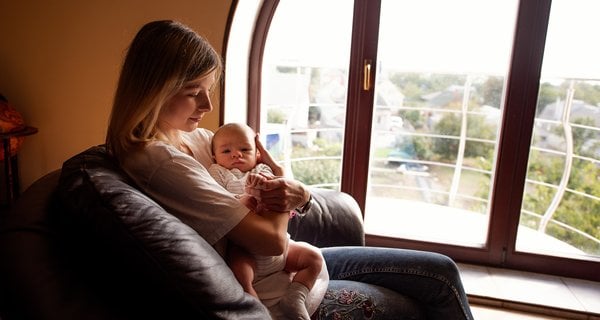Playtime with Books (PwB) is a digital book-sharing intervention for children aged 10-24 months based on Murray and Cooper’s evidence-based shared picture book intervention, adapted for virtual delivery.
The programme aims to promote parental sensitivity and support and reinforce parents’ use of positive book-sharing skills with their young child. It consists of five self-directed online skill sessions and up to three personalised video-feedback support calls provided virtually by practitioners from local early-years services. Facilitators guide parents through the programme, encouraging them to practice new skills and film themselves sharing books with their child. They build a relationship with the parent via a welcome call and have three online calls with the parent to give supportive feedback about their recorded videos.
Our aim was to identify and test improvements to the PwB service so that it works better for delivery partners and families unable to access face-to-face book-sharing programmes. PEDAL, with support from Nesta, delivered PwB in two cycles of delivery across three local authorities. This report shares the analysis and findings from the first cycle of delivery only, as well as interviews and surveys conducted with parents and facilitators.
What's in the report
We are pleased to now share the findings from both cycles of delivery.
This final report builds on the report of the findings from the first cycle of delivery, expanding on the key questions left unanswered for both cycles of delivery:
- Who did we recruit and how did they participate and engage with the Playtime with Books programme?
- How did families and facilitators experience and engage with PwB in our local authority sites?
- Did the new digital platform improve the programme experience for families and facilitators?
Key findings from the report
1. Families enjoy and benefit from the PwB programme
Families enjoyed learning how to book share with their child in the skills sessions and receiving individualised support from facilitators in the video-feedback calls to support their skills. They perceived a positive impact of the programme, including sharing books more frequently, feeling more confident doing so, that their child enjoyed sharing books and positive changes in their child’s language since participating in the programme. Similar to previous testing, this demonstrates the high acceptability of the programme to families and supports its theory of change.
2. Facilitators value the programme, although they face challenges in finding the time to deliver it
Facilitators valued the different elements of the programme and perceived a positive impact of providing video feedback to parents, such as building parents’ confidence in book sharing and supporting the parent-child bond. Although facilitators viewed the programme positively, many struggled to fit in the time required, indicating that more protected time for practitioners to prepare and deliver the calls alongside their usual workload is required.
3. Families and facilitators require a simple and intuitive digital experience that meets their different needs
Early years practitioners did not find the new digital platform and processes feasible or acceptable to deliver the programme. The experience of the platform, although still mixed, was more positive for parents, suggesting that these users have different needs when interacting with an online programme. This indicates that a different delivery platform is needed that requires minimal interaction/input from facilitators, using processes and systems they are already comfortable with, and that provides a smoother user experience for parents, in order to deliver the programme at scale and keep parents/facilitators engaged.
This testing has provided crucial learning about what works for both families and facilitators and how this differs. PEDAL will use this learning to build a new bespoke, streamlined platform with Nesta’s design and technology practice and a digital agency, which is more attuned to what all of our users require.
4. Despite initial high interest, many parents dropped out before starting the programme. Once parents started the programme content, engagement was higher
Parents were recruited through digital and physical flyers, in-person outreach at children’s centres, and social media. Of the 58 families initially allocated to local facilitators, 46 completed the baseline assessment. Just under half (41.3%) of these families were classified as highly disadvantaged (based on income, benefits status, or education level).
Although we did not pre-define completion criteria, we considered participation in at least three of five skills sessions and two of three check-in calls as a threshold for completion. Based on this, 21 of the 32 families who began the programme completed it (65.6%), with seven from the high-disadvantage group. Eleven families did not complete the programme, eight of whom were from the high-disadvantage group.
Disengagement was driven by a range of factors, including time pressures, changing personal circumstances, work and childcare demands, and in some cases, limited engagement from facilitators. To help mitigate this and challenges with the digital platform, we made changes between cycles of delivery to help with drop off after sign up, crucially improving and streamlining the process to book welcome calls. To support future engagement, PEDAL plans to introduce parent champions in each local area and develop a new digital platform to enhance connection, support, and retention among participating families.
5. Multi-disciplinary, cross-sector collaboration and implementation science approaches can help to drive scale-up
This project benefitted from a unique collaboration bringing together Nesta’s innovation expertise with PEDAL’s knowledge of developmental and intervention science. By bringing together diverse perspectives and expertise in design, digital innovation, co-production and child development and using implementation science approaches (e.g., small cyclical tests of change, stakeholder feedback, and a staged approach to scale up) we were able to dig into challenges and build solutions that will help PEDAL to move to a more ambitious phase of testing and roll-out of the Playtime with Books programme. In their next phase of work, PEDAL will build on their place-based approach to co-production, delving further into the system and stakeholders’ needs to refine and roll out a more intuitive digital experience that can help to widen parents’ access to support with their child’s home learning environment.
Next steps
PEDAL, with guidance and grant funding from Nesta, will develop a new, bespoke digital platform for Playtime with Books, responding to the learning from this phase of work about the advantages and disadvantages of the current platform.
PEDAL is preparing for an implementation study funded by the Nuffield Foundation, which began in April 2025.












